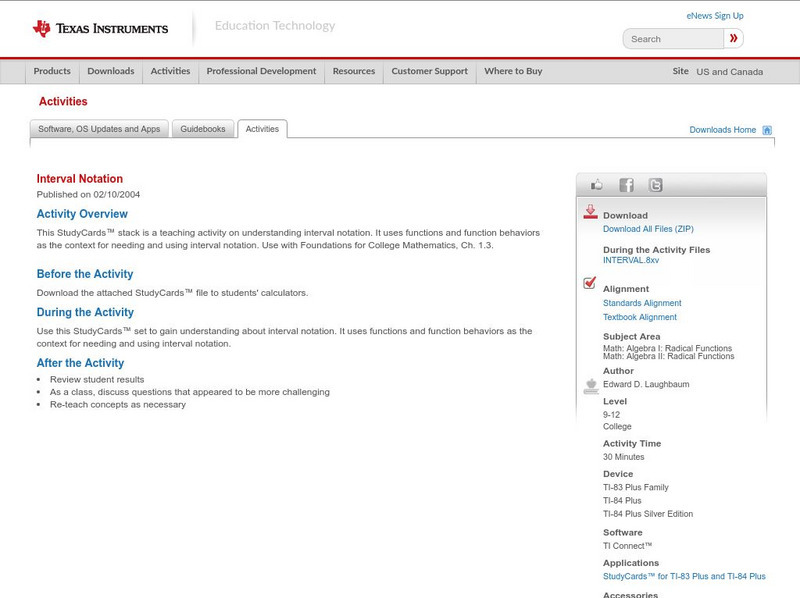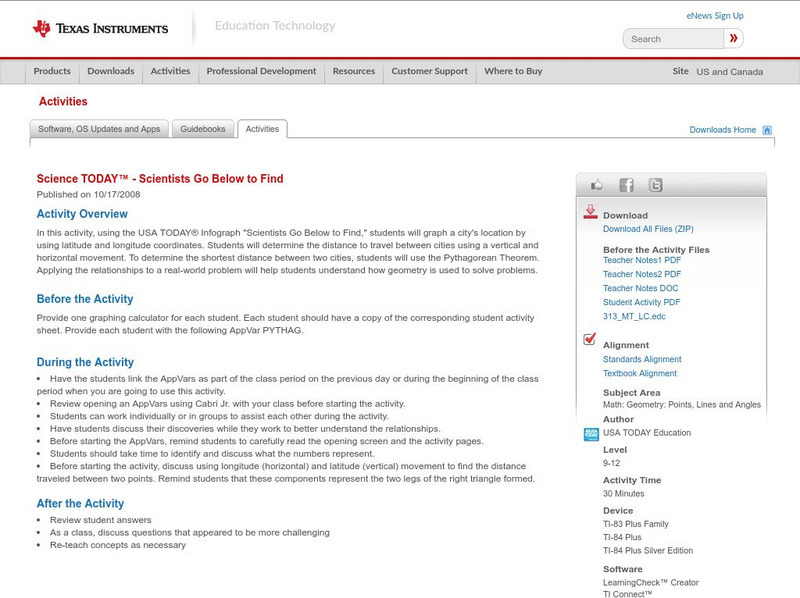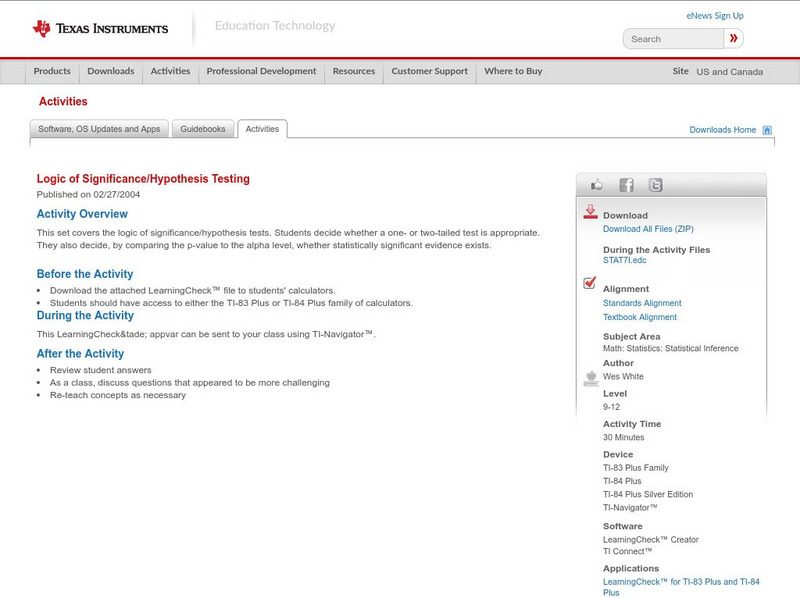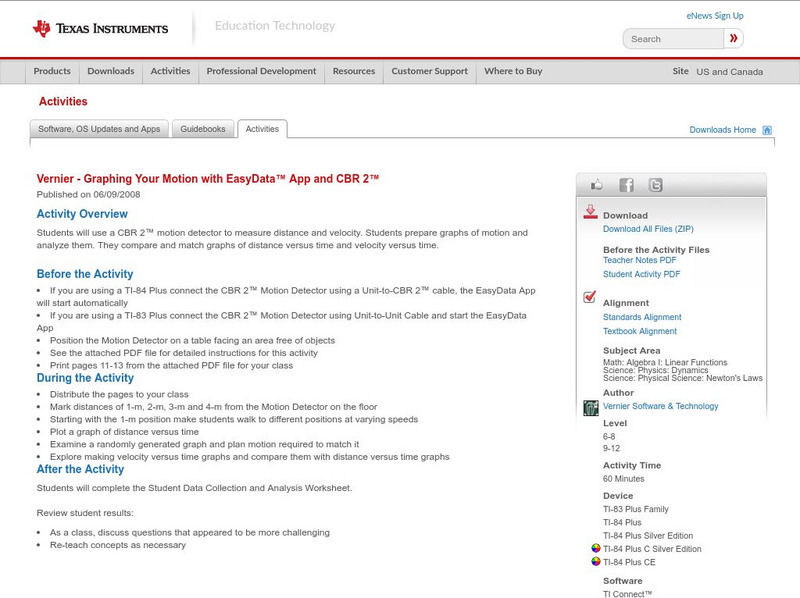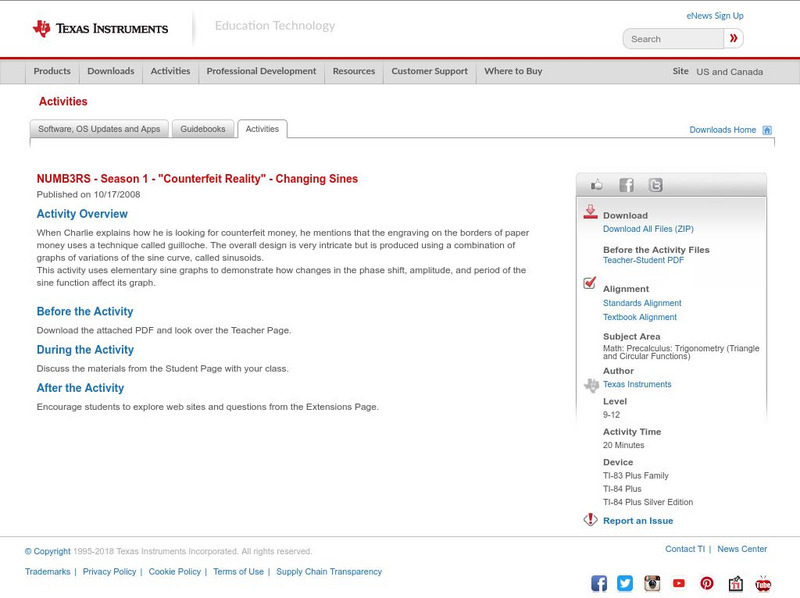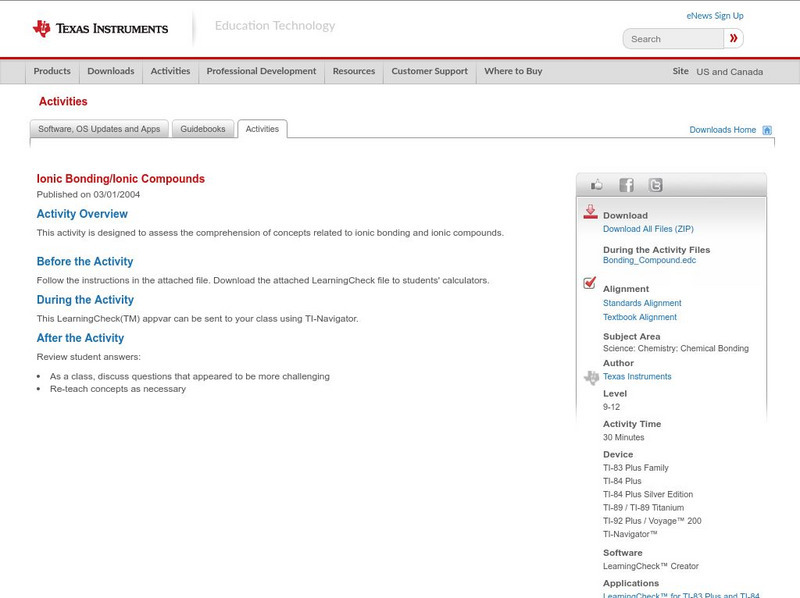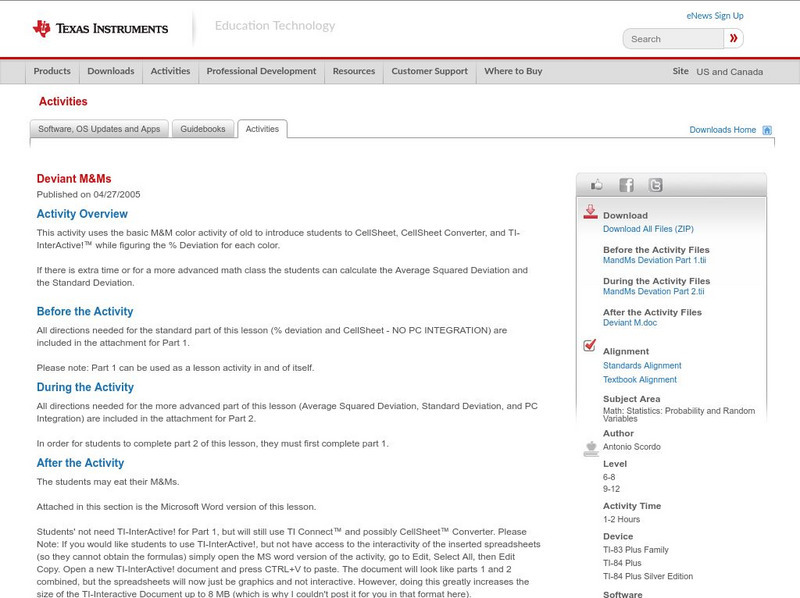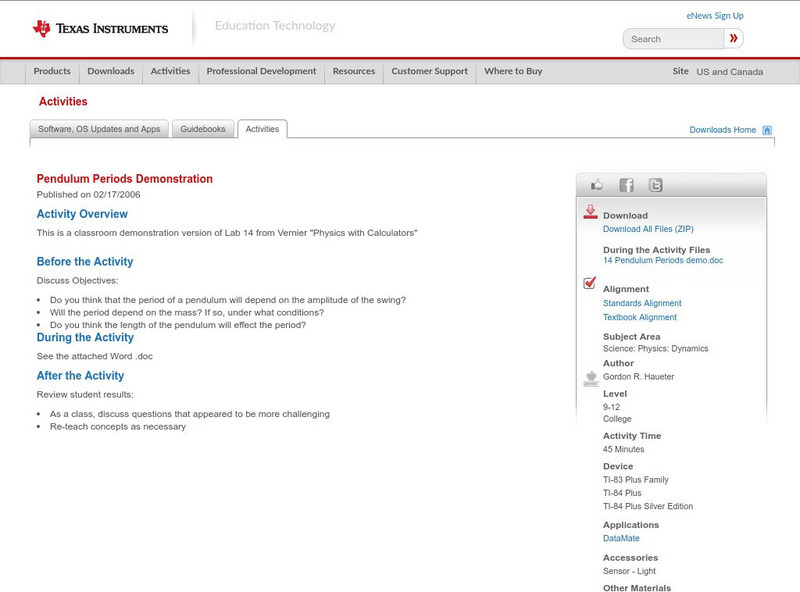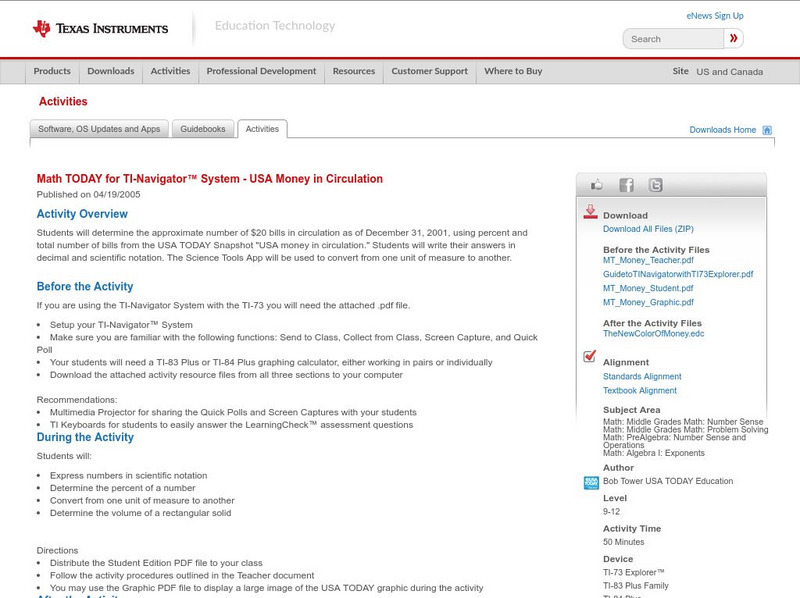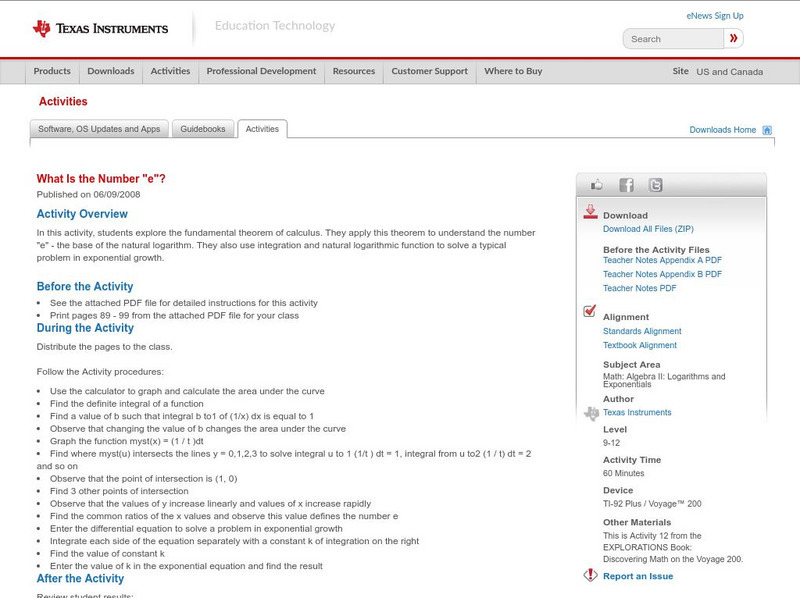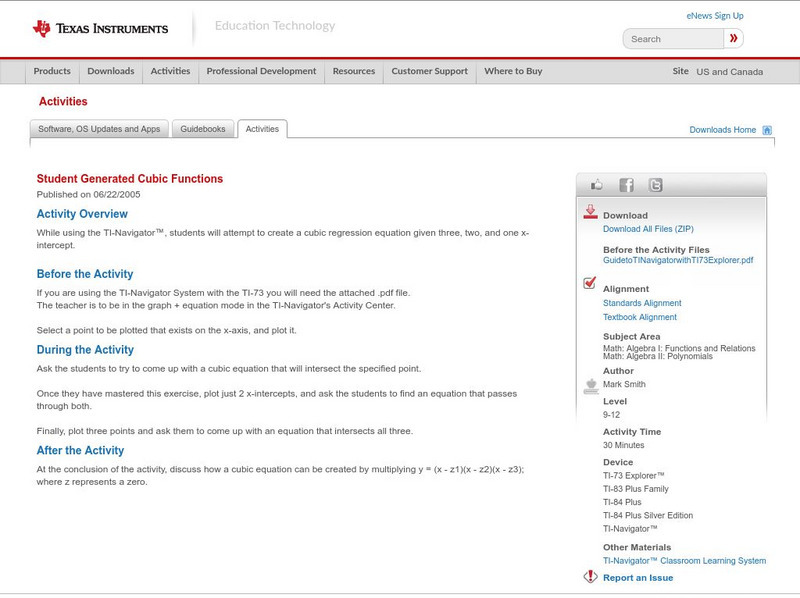Texas Instruments
Texas Instruments: Create Box and Whisker Plots
Students use a graphing calculator to create box-and-whisker plots and learn the usefulness of them. Students identify the five summary statistical values of data sets - minimum, first quartile, median, third quartile, and maximum values.
Texas Instruments
Texas Instruments: Interval Notation
This StudyCard stack is a teaching activity on understanding interval notation. It uses functions and function behaviors as the context for needing and using interval notation.
Texas Instruments
Texas Instruments: Science Today Scientists Go Below to Find
In this activity, using the USA TODAY Infograph "Scientists go below to find," students will graph a city's location by using latitude and longitude coordinates. Students will determine the distance to travel between cities using a...
Texas Instruments
Texas Instruments: Numb3 Rs: Guess My Type or Lose
Based off of the hit television show NUMB3RS, this lesson has students take a greater look at tree diagrams, especially in relation to decision making. Game theory figures in on this lesson, as students try to determine which choices...
Texas Instruments
Texas Instruments: Logic of Significance/hypothesis Testing
This set covers the logic of significance/hypothesis tests. Students decide whether a one- or two-tailed test is appropriate. They also decide, by comparing the p-value to the alpha level, whether statistically significant evidence exists.
Texas Instruments
Texas Instruments: Graphing Your Motion With Easy Data App and Cbr 2
Students can use a CBR 2 motion detector to measure distance and velocity. Students prepare graphs of motion and analyze them. They compare and match graphs of distance versus time and velocity versus time.
Texas Instruments
Texas Instruments: Numb3 Rs: Changing Sines
Based off of the hit television show NUMB3RS, this lesson introduced students to the various parameters used in graphing the elementary sine function. Technology use is very heavy, as students are encouraged to graph different sinusoidal...
Texas Instruments
Texas Instruments: Cells Never Lie
A forensics activity which deals with the idea of alcohol poisoning. Based on a Biology Lab on cell distruction in alcohol and Chemistry's Beer's Law.
Texas Instruments
Texas Instruments: Ionic Bonding/ionic Compounds
This activity is designed to assess the comprehension of concepts related to ionic bonding and ionic compounds.
Texas Instruments
Texas Instruments: What Goes Up: Position and Time for a Cart on a Ramp
In this activity, students' will use a motion detector to measure how the position of a cart on a ramp changes with time. They will then determine a parabolic model for the position data using the intercepts.
Texas Instruments
Texas Instruments: Techniques for Evaluating Limits
Students are given the techniques for evaluating limits with and without using a graphing calculator. Both limits as x approaches a and as x approaches +/- infinity are given.
Texas Instruments
Texas Instruments: Deviant M&ms
This activity uses the basic M&M color activity of old to introduce students to CellSheet, CellSheet Converter, and TI-InterActive! while figuring the % Deviation for each color. If there is extra time or for a more advanced math...
Texas Instruments
Texas Instruments: Pendulum Periods Demonstration
This is a classroom demonstration version of Lab 14 from "Physics with Calculators"
Texas Instruments
Texas Instruments: Let's Integrate All Things Easy
This activity is designed to help students deal with the method of integration by parts. In this method, students usually have trouble figuring out what they should set u equal to.
Texas Instruments
Texas Instruments: Cell Vocabulary
This StudyCards stack enables students to review the vocabulary associated with cell biology.
Texas Instruments
Texas Instruments: Math Today for Ti Navigator Usa Money in Circulation
Students will determine the approximate number of $20 bills in circulation as of December 31, 2001, using percent and total number of bills from the USA TODAY Snapshot "USA money in circulation." Students will write their answers in...
Texas Instruments
Texas Instruments: What Is the Number "E"?
In this activity, students explore the fundamental theorem of calculus. They apply this theorem to understand the number "e" - the base of the natural logarithm. They also use integration and natural logarithmic function to solve a...
Texas Instruments
Texas Instruments: Student Generated Cubic Functions
While using the TI-Navigator, students will attempt to create a cubic regression equation given three, two, and one x-intercept.
Texas Instruments
Texas Instruments: Numb3 Rs: I, It, Itera, Iteration
Based off of the hit television show NUMB3RS, this lesson introduces students to the notion of Brownian motion and has students graph a sample Brownian particle. In Brownian motion, each "step" depends on the "steps" taken previously,...
Texas Instruments
Texas Instruments: Cabri Jr. The Equation of a L Ine
This activity uses Cabri Jr. to graph a line and show the equation of the line. The equations for oblique, horizontal and vertical lines are explored with emphasis on slope and y-intercept.
Texas Instruments
Texas Instruments: Behaviors Rational Functions
This StudyCard set teaches and tests on the rational function. Shows connection between the function parameters and the resulting geometric behaviors of the rational function. Use with Foundations for College Mathematics, ch. 7.1.
Texas Instruments
Texas Instruments: Rhode Island Ride Practice Exams Math
Students can use these LearningCheck item banks to prepare for the following - grade 10 Rhode Island RIDE math exam.
Texas Instruments
Texas Instruments: Differential Equations
In this activity, students analyze first order, second order, and autonomous systems of two first order differential equations.
Texas Instruments
Texas Instruments: Slow Down: Speed Up
In this activity, students' will use a motion detector to observe the effect of speeding up, slowing down, and moving at a constant rate on a Distance versus Time plot.



